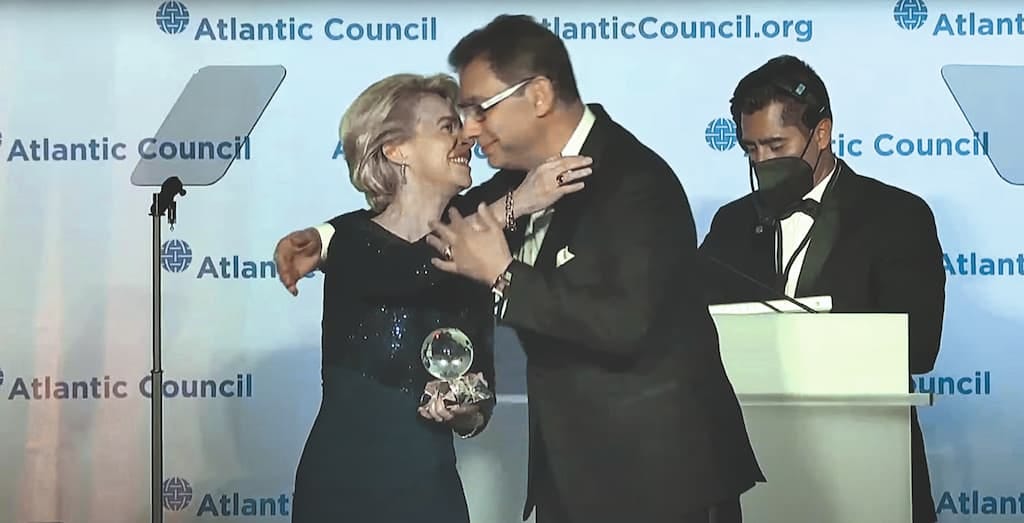Ursula And The Serpent
A Contemporary Amoral Tale
If Pfizergate, starring Ursula von der Leyen and Albert Bourla, is not the greatest scandal since the Garden of Eden, it is one of the most expensive for EU member states.
The two narratives bear certain similarities: both involve a man and a woman in a very special place (Eden, Europe) in intimate communication without witnesses, it involves the transaction of goods, apple in the first dossier, vaccines in the second – roles reversed, it is now the man giving the forbidden fruit to the woman at a high mark-up. In both cases a private affair with catastrophic, irreversible, worldwide effects.
The second entente fatale takes place in modern times, on a telephone, an instrument of privacy unavailable to Adam and Eve. Whether God was listening in to the private conversations of Ursula von der Leyen and Albert Bourla remains an open question. Better for him if God was off in some far galaxy tinkering, screwing new stars to the firmament or stashing his treasures before Musk gets to Mars. I can’t imagine the Almighty getting any kicks listening in to those two.
In as much as the Garden of Eden took place before democracy was invented, there are differences, the principal being that our two main characters today seem wholly unaffected by their crime. They continue wandering the face of this earth unmolested. Modern times, man ! Do anything you like, just so long as you’re prepared to tough it out. Keep on doing it, do it differently, stare at anyone asking questions like they’re mad. If only Adam and Eve had had such wise counsel. They could’ve told God they weren’t going to budge.
A short, sober, impartial guide to the history of this affaire follows.
YOU REALLY WANT TO KNOW
Background on Pfizer
Summarizing in a timely manner, and stopping at 2016, well before the pandemic: in 1994, pharma-giant Pfizer payed $10.75 million to settle U.S. Justice Department claims that the company lied to get Federal approval for a defective mechanical heart valve that killed hundreds of patients worldwide; in 2004, Pfizer paid $430 million to resolve criminal and civil charges that it paid doctors to prescribe its epilepsy drug, Neurontin, to patients with ailments that the drug was not approved to treat; in 2004, a $60 million settlement of a class-action lawsuit over its diabetes drug, Rezulin, withdrawn from the market in March 2002 after about 100 people who took it had to have liver transplants or died from acute liver failure; in 2008, Pfizer was publicly admonished for manipulating the publication of scientific studies to bolster the use of its epilepsy drug Neurontin; in 2009 came the largest health care fraud settlement in the history of the U.S. Department of Justice, $2.3 billion for criminal and civil liability from the illegal promotion of certain pharmaceutical products; in 2010, Pfizer admitted paying $35 million to doctors over the previous 6 months, to encourage the use of their products; in 2011, Pfizer conceded defeat after a 15-year legal battle brought by parents of four Nigerian children who died of meningitis during a controversial drug trial; in 2012, Pfizer paid the U.S. government $60 million to settle allegations that its employees bribed doctors and other foreign officials in Europe and Asia to win business and boost sales; again in 2012, Pfizer paid $26 million in SEC charges for bribing doctors and other health care professionals; in 2016, Pfizer was fined a U.K.-record £84.2m for overcharging the NHS. In total Pfizer has had 90 court-sanctioned violations since 2000, paying $10 billion in fines.
(Cynics note that American and British government healthcare and hospitals, as well as the U.S. military and veterans services are among the biggest consumers of Pfizer products on the planet, so, in fact, much of these Record Fines simply made the old-fashioned loop-di-loop back into Pfizer’s pockets. So it goes.)
Thus we can laugh outloud when we listen to Albert Bourla, Pfizer Director General since 2019, complain that a group of medical professionals, criminals in his estimation, were intentionally circulating “misinformation” critical of the Pfizer COVID vaccine. He might know a thing or two about the subject.
Eve, you will remember, had never met the serpent before. But Ursula von der Leyen, can she claim to be ignorant of Pfizer’s past ?
HEART OF THE MATTER
The Jury may be seated
Albert Bourla is on record as saying that he cultivated a “close relation with Ursula von der Leyen via SMS and telephone calls” since at least January 2021. This admission is enough to set the hounds baying, as it runs contrary to European commercial regulations, much less those of the huge bureaucratic machine that is the EU. The supranational organization has refused to provide the content of the two parties’ communications, claiming they fall outside of ‘documentation’ available to whistleblowers. They are presumed deleted and lost.
BioNTech/Pfizer was the first pharmaceutical to receive EU authorisation, in December 2020, for a COVID vaccine but it has subsequently been revealed that the deal – or in the New York Times’ phrase, an arrangement where “personal diplomacy played a big role” – was agreed to a month earlier, in November, on a phone call between the two parties.
Despite the loss of evidentiary materials, the details of the EU-Pfizer deal are well known and indeed, staggering: negotiating on behalf of European Union member states (with their money) without oversight, documentation or expert assistance, Ursula von der Leyen, in conversation with Albert Bourla, arranged to purchase approximately 1.8 billion doses of the Pfizer vaccine for 36€ billion, tout hors la loi. Money aside, a total number of doses that if broken down by population, would have provided 10 vaccinations for every German. The first batch of doses to be delivered was to be 200 million, total vaccines being enough, in von der Leyen’s rosy estimation, to have all Europe vaccinated by the summer.
We know about the story because a single whistleblower, the Belgian Alexander Fanta, filed a request with the EU Commission for access to the Leyen-Bourla text messages. “No documents falling within the scope of request could be identified” was the terse response from the Commission. The New York Times was next in April 2021.
Now, in 2025, the action moves to a courtroom in Liège, Belgium, for what may be the most serious challenge to von der Leyen’s legal immunity; indeed it may provide the first intimate glimpse of her unprecedented and authoritarian leadership under whatever spotlight proceedings allow, in a different epoch, after the great wave of fear that gripped the populace like a tsunami during the pandemic has receded.
It’s important to note that these proceedings do not concern any side-effects from Pfizer’s COVID vaccines. They are about the protocol of purchase. In such a manner do the mills of justice grind.
The court has anounced a date of January 20 for their ruling on von der Leyen’s claim of immunity and the court’s right to procede. You might not hear about it due to another earthshaking event taking place in Washington, D.C. tomorrow.
*
Even paying customers can buy me a cup of coffee if they’re feeling generous. I practically live on the stuff. Acerbic asides always appreciated below.



